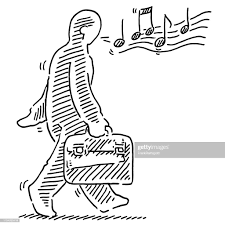
If you were to ask me the most significant characteristic of modern life as compared to all previous ages I would point to the fact that we hardly ever sing. Or, to state the matter differently, that all modern life is secretly sad.
When people are happy and spiritually healthy, they sing. One of the first signs and symptoms that our modern age is miserable and spiritually diseased is that we no longer lift our voices in song and sing together.
This might sound a bit strange, since we besieged by noise to the point where we can hardly find a place anywhere to enjoy silence. We have noise—which includes music sung or played by others—constantly assaulting us, blasting from loudspeakers in shopping malls, coming from radios in cars, from cellphones through earphones, and even piped in when riding an elevator for a few minutes (hence the insult that some music sounds like “elevator music”). And though we listen to such noise and music constantly, we never sing ourselves. And because we do not sing, the music fails to relieve our sadness.
Listening to fine music can entertain us, or it can inspire us, or it can lull us, or it can excite us. But for all the entertainment, inspiration, lulling, and excitement, our modern life remains hopelessly sad. If you doubt this, compare the modern suicide rates for young people compared with such rates in all previous ages.
Consider too the common life of the common labourer in ages past: what stands out about it from our modern perspective is that although life and work were hard, people sang as they worked. Labourers in the fields sang in chorus as they reaped the harvest and gathered it in, and sailors sang together as they hauled on the ropes of their ships. Women at home sang as they kneaded the flour and baked their daily bread.
Singing throughout the day as one worked was the way of the world throughout its history, whether the workers were ancient Egyptians toiling to build the pyramids or our great-grandfathers toiling to bring the harvest home. And even after work was over, when people would meet together in their homes, they would sing together, passing along the songs which they had learned at their grandmother’s knee. Compared to such regular sociability and hilarity—the eating and drinking and laughing and singing together of friends and family after a long day’s work—our modern evenings look pale and thin. What is Netflix compared to this? Their days and their evenings were passed in song. Ours are not, for as a society we never sing.
Our ancestors sang as they walked down the road to the fields in which they would labour that day, but no one sings while they ride the bus to their place of work, or even in their cars where such joyful noise would disturb no one. I often see construction workers here in my city of Surrey, but they never lift their voices in chorus while swinging their hammers or holding their flags.
This change from joyful song to surly silence is fundamental. As G.K. Chesterton in his book Tremendous Trifles once observed about the change, “there is something spiritually suffocating about our life; not about our laws merely, but about our life”. Indeed. For it is impossible to sing while one is being suffocated.
Singing, I repeat, is the symptom of spiritual health, and of a soul set free. Birds sing in the trees because they are free, and human freedom, true freedom, always finally expresses itself in song. That is why the words of national anthems are meant to be sung, not recited.
And that is why all Christian worship, since it is the expression of sinners forgiven and set free, contains a large musical element. That is, in worship we do not merely listen to music made by others, but are called to sing the music ourselves. (There is room here for a digression on the importance of congregational singing, but we leave it for another time.) Indeed, all Orthodox worship is meant to be sung, for it is the expression of a joyful and liberated heart, and joy
as Fr. Alexander Schmemann often reminded us, is the primary characteristic of the Christian. Indeed, he felt that the deepest insult and the worst accusation a pagan could hurl at the Christians was to point out that they had no joy. If therefore joy is the defining characteristic of Christians, then singing should be their primary and continual occupation.
Such singing, if we return to it as practised by our ancestors, will certainly set us apart from the mass of secular society. But that is fine. Indeed, it may also serve as a means of evangelism, as people wonder aloud, “Why are those Christians so happy and why are they always singing?” As Chesterton also observed about the phenomenon of singing in church, “Human nature is hunted, and has fled into sanctuary”. And it is in the sanctuary that human nature can now flourish. If we continue to sing in our sanctuaries, perhaps the world will come and join us.
